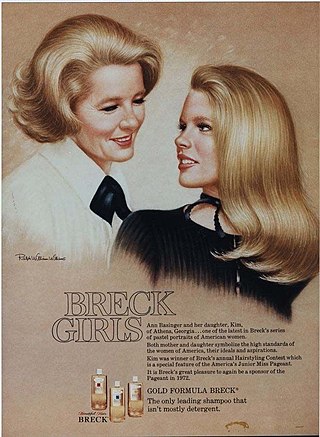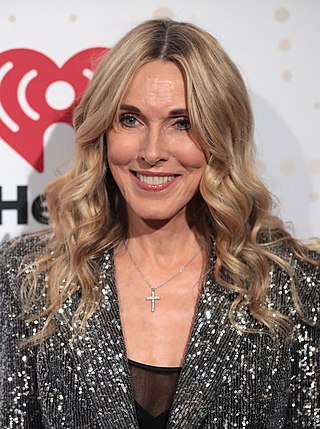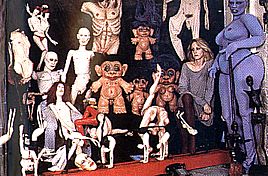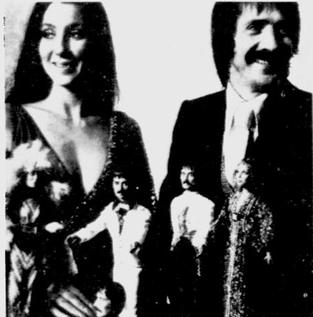
Charlie's Angels is an American crime drama television series that aired on ABC from September 22, 1976, to June 24, 1981, producing five seasons and 115 episodes. The series was created by Ivan Goff and Ben Roberts and was produced by Aaron Spelling. It follows the crime-fighting adventures of three women working at a private detective agency in Los Angeles, California, and originally starred Kate Jackson, Farrah Fawcett, and Jaclyn Smith in the leading roles and John Forsythe providing the voice of their boss, the unseen Charlie Townsend, who directed the crime-fighting operations of the "Angels" over a speakerphone. There were a few casting changes: after the departure of Fawcett, Cheryl Ladd joined; after Jackson departed, Shelley Hack joined, and she was subsequently replaced by Tanya Roberts.

Farrah Leni Fawcett was an American actress. A four-time Primetime Emmy Award nominee and six-time Golden Globe Award nominee, Fawcett rose to international fame when she played a starring role in the first season of the television series Charlie's Angels.

A pin-up model is a model whose mass-produced pictures and photographs have wide appeal within the popular culture of a society. Pin-up models are usually glamour models, actresses, and fashion models whose pictures are intended for informal, aesthetic display, such as being pinned onto a wall. From the 1940s, pictures of pin-up girls were also known as cheesecake in the U.S.

Cheryl Rae Tiegs is an American model and fashion designer. Frequently described as America's first supermodel, Tiegs made multiple appearances on the covers of the Sports Illustrated Swimsuit Issue and Time magazine.

Jaclyn Smith is an American actress. She is most notable for her role as Kelly Garrett in the television series Charlie's Angels (1976–1981), and was the only original female lead to remain with the series for its complete run. She reprised the role with cameo appearances in the films Charlie's Angels: Full Throttle (2003) and Charlie's Angels (2019). Her other films include Nightkill (1980) and Déjà Vu (1985). Beginning in the 1980s, she began developing and marketing her own brands of clothing and perfume.

Eve Arnold, OBE (honorary), FRPS (honorary) was an American photojournalist, long-resident in the UK. She joined Magnum Photos agency in 1951, and became a full member in 1957. She was the first woman to join the agency. She frequently photographed Marilyn Monroe, including candid-style photos on the set of The Misfits (1961).

Patrick Demarchelier was a French fashion photographer.

Big hair is a hairstyle that emphasizes large volume or largely styled hair, especially when those styles make the hair occupy a large amount of space above and around the head. The label "big hair" for such styles originated in the late 1970s, when these styles were beginning a period of popularity. Similar styles have become fashionable at various periods in history.
Douglas Morley Kirkland was a Canadian-born American photographer. He was noted for his photographs of celebrities, especially the ones he took of Marilyn Monroe several months before her death.

Breck Shampoo is an American brand of shampoo that is also known for its Breck Girls advertising campaign.

Sunburn is a 1979 British-American comedy detective film directed by Richard C. Sarafian and written by James Booth, John Daly and Stephen Oliver. It is based on the novel The Bind by Stanley Ellin. The film stars Farrah Fawcett, Charles Grodin, Art Carney, Joan Collins, William Daniels and John Hillerman. The film was released on August 10, 1979, by Paramount Pictures.

Alana Hamilton Stewart is an American actress and former model. She has also used her maiden name, Alana Collins, and her names from her first marriage, Alana Collins-Hamilton and Alana Hamilton professionally.
Pro Arts (1967–1984) was a poster company founded in Ohio, United States that would create the top selling poster in the world, the Farrah Fawcett swimsuit poster. The poster sold over 12 million copies but the company couldn't survive and in a controversial series of events the company filed for Chapter 11 bankruptcy in 1981 and was liquidated in 1984.

Greer Lankton, was an American transgender artist known for creating lifelike sewn dolls that were often modeled on friends or celebrities and posed in elaborate theatrical settings. She was a key figure in the East Village art scene of the 1980s in New York.
Joanne Gair, nicknamed Kiwi Jo, is a New Zealand-born and -raised make-up artist and body painter whose body paintings have been featured in the Sports Illustrated Swimsuit Issue from 1999 to 2017. She is considered the world's leading trompe-l'œil body painter and make-up artist, and she became famous with a Vanity FairDemi's Birthday Suit cover of Demi Moore in a body painting in 1992. Her Disappearing Model was featured on the highest-rated episode of Ripley's Believe It or Not. She is the daughter of George Gair.

The Sonny & Cher dolls were a collection of 12-¼ inch high celebrity doll likenesses of pop rock duo Sonny & Cher. The line was released by Mego Corporation in 1976. The release of these fashion dolls coincided with the popularity of The Sonny & Cher Show prime time variety TV show.

Guerrillero Heroico is an iconic photograph of Marxist revolutionary Che Guevara taken by Alberto Korda. It was captured on March 5, 1960, in Havana, Cuba, at a memorial service for victims of the La Coubre explosion. By the end of the 1960s, the image, in conjunction with Guevara's subsequent actions and eventual execution, helped solidify the leader as a cultural icon. Korda has said that at the moment he shot the picture, he was drawn to Guevara's facial expression, which showed "absolute implacability" as well as anger and pain. Years later, Korda would say that the photograph showed Che's firm and stoical character. Guevara was 31 years old at the time the photograph was taken.

Norma Kamali is an American fashion designer. She is best known for the "sleeping bag" coat, garments made from silk parachutes, and versatile multi-use pieces.

Charlie's Angels is an American media franchise created by Ivan Goff and Ben Roberts and owned by Sony Pictures Entertainment, which began with the original television series of the same name. The franchise follows the adventures of the Angels, a team of women working for the Townsend Agency, a private secret agent agency, under the leadership of Charlie Townsend, their unseen boss.

















